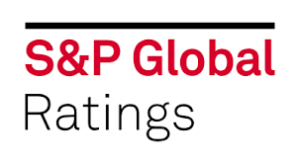
Ukraine’s economic growth will continue in 2024 on the back of expanding domestic demand and a further recovery in seaborne exports, but it will fall to 3.9% from around 5.5% last year due to the high base effect created by the past strong agricultural season, international rating agency S&P Global Ratings forecast.
“Absent a significant escalation of the war, we forecast Ukraine’s economy to grow by about 4-5% on average over the medium term, but a recovery to pre-war levels is unlikely in the foreseeable future,” it said in its release on Saturday night as it downgraded Ukraine’s long-term foreign currency rating to ‘CC’ from ‘CCC’ with a negative outlook amid an expected Eurobond restructuring.
S&P estimates that average annual inflation will fall to around 7% this year from 12.8% last year, but it will pick up in the second half of this year amid weakening base effect, recovering domestic demand and moderate currency depreciation.
The agency expects the hryvnia to depreciate to 41.02 UAH/$1 at the end of this year and to 43.89/$1 at the end of next year.
S&P emphasizes that the development of the war with Russia continues to shape Ukraine’s macroeconomic outlook. It is unclear how the war may evolve, but we believe a military stalemate without any major changes on the front lines remains the most likely scenario as both sides resign themselves to a protracted war. The prospect of any negotiated peace plan seems unlikely. As a result, we assume that the active phase of the war will last until the end of this year, and most likely beyond,” the document says.
The agency recalls that Russian troops have occupied about 15% of Ukraine’s territory, which accounts for about 8-9% of its pre-war GDP, 14% of industrial and 10% of agricultural production. Almost a third of Ukraine’s population has been displaced and about 15% have fled the country and are now refugees living mainly in the EU.
Nevertheless, according to S&P’s baseline scenario, the Ukrainian government and the NBU will maintain their administrative capacity even in the face of serious military attacks.
Given the significant damage to physical and human capital, Ukraine’s medium-term economic prospects are subject to a high degree of uncertainty, the agency notes. In its view, the key factors determining the country’s recovery prospects are the evolution of the war, post-war demographics and labor market profile, as well as the effectiveness of reconstruction efforts and continued international support.
S&P notes a high degree of uncertainty about the scope, outcome and consequences of the Russia-Ukraine war. In its view, regardless of the duration of hostilities, the associated risks are likely to persist for some time.
As reported, the National Bank of Ukraine in January estimated the country’s GDP growth in 2023 at 5.7% and maintained its 2024 growth forecast at 3.6%, slightly worsening it for 2025 – from 6.0% to 5.8%.
The government, when approving the draft state budget for the second reading in early November 2023, improved last year’s GDP growth estimate from 2.8% to 5%, but worsened it for 2024 from 5% to 4.6%.
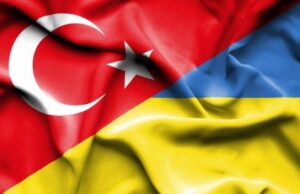
An agreement between the Government of Ukraine and the Government of Turkey on the establishment of a system for the electronic exchange of preliminary information on goods and vehicles moving between the parties was signed in Istanbul on Friday as part of a meeting between President of Ukraine Volodymyr Zelenskyy and President of Turkey Recep Tayyip Erdogan.
“According to the document, information exchange will be carried out between the State Customs Service of Ukraine and the Ministry of Trade of Turkey. Based on the agreement, a system of electronic exchange of preliminary information will be created, through which a predetermined set of data will be exchanged in electronic form,” the press service of the President of Ukraine reports.
It is noted that the information received by the customs authorities of the parties will help speed up the movement of goods and vehicles across the borders of both states, as well as counteract customs offenses.
On behalf of Ukraine, the agreement was signed by Defense Minister Rustem Umerov, and on behalf of Turkey – by Trade Minister Omer Bolat.
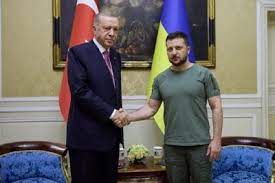
Volodymyr Zelensky has arrived in Istanbul to meet with Turkish head of state Recep Tayyip Erdogan.
The airplane with the Ukrainian leader and his accompanying delegation on board landed at Ataturk Airport, Turkish media reported.
As part of the visit of the Ukrainian delegation, Zelensky will meet with President Erdogan. A joint statement of the two leaders is expected to be signed following the talks.
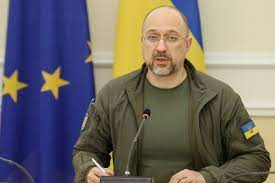
Ukraine is ready to extend the transit of Russian gas through its gas transportation system (GTS) at the initiative of the European Union countries, but will not extend the current contract or sign a new one with Gazprom, Prime Minister Denis Shmygal said at a press conference in Kiev on Monday.
“We are certainly not going to negotiate with the aggressor country to extend (the transit contract) and put our signatures under the agreement, but we have had repeated talks with European leaders on the basis of the European Commission. If European countries will act as a consortium or one of the European partners will act as a transit company for its own gas, we are ready to provide such a service. Here the initiative is on the side of the EU and our European partners,” he said.
“Group, association, consortium… It could be the EC, a group of European countries that are interested in preserving transit,” Shmygal specified.
At the same time, according to the Prime Minister, the GTS of Ukraine is ready to function without the transit of Russian natural gas.
As reported, the transit of Russian natural gas through the gas transportation system (GTS) of Ukraine in 2023 decreased by 28.4% (by 5 billion 812.6 million cubic meters) compared to 2022 – to 14 billion 646.6 million cubic meters.
The contract between Naftohaz Ukrainy and Gazprom for the organization of transportation, the transportation agreement between NAK and OGTSU, as well as the inter-operator agreement between OGTSU and Gazprom were signed on December 30, 2019. The contract provides for transit of 40 billion cubic meters of gas per year in 2021-2024.

Ukraine intends to create an Investment Attraction Agency as a single entry point for investors in the Ukrainian private sector, First Deputy Prime Minister Yuliya Sviridenko said on Facebook.
“To ensure that all investors wishing to invest in the private sector in Ukraine have a single point of entry, we are working on the launch of a single institution – the Investment Attraction Agency,” she wrote following a visit to London, where she discussed its creation, including with the London Stock Exchange (LSE).
According to her, during the meeting, LSE specialists assured that they are ready to provide their expertise and help build this institution.
Sviridenko said she also met with British International Investment, which last summer at a conference on Ukraine’s reconstruction in London said it was ready to allocate GBP250 million to finance the private sector in Ukraine, mainly for post-war reconstruction.
“These funds will be available from April through the Co-investment platform. What can we do together with the private sector already now to get this funding? Prepare quality projects. For this purpose we also attract partners to jointly do feasibility study, “- First Deputy Prime Minister said.
She added that attracting investment and financing to Ukraine was also the main topic of negotiations with the European Bank for Reconstruction and Development, the London Stock Exchange and TheCityUK, UK Export Finance (UKEF).
“We are working with UKEF to attract investments in the defense sector. We have also opened a GBP3.5bn limit for Ukraine. Several companies have already received insurance, one of them yesterday during our visit to London. We plan to expand cooperation, in particular, we discussed the possibility of insuring suppliers of equipment in the field of military demining,” Sviridenko wrote, in particular.
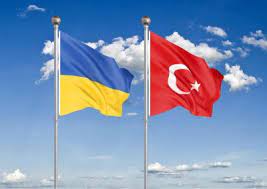
Ukraine’s Ministry of Communities, Territories and Infrastructure Development has agreed with Turkey’s Ministry of Transport and Infrastructure to extend the liberalization of freight transport, the ministry’s press service said on Thursday. According to the ministry, the “transport visa-free zone” or liberalization of freight transport with Turkey, includes bilateral freight traffic and transit traffic, the ministry said.
“Of all the exports we deliver to Turkey, about 15% are by road transport. Turkish companies import to us exactly by road transport almost 60% of the total volume of goods,” said Deputy Prime Minister for Reconstruction – Minister of Community Development, Territories and Infrastructure Alexander Kubrakov.
As a result of the agreement, the parties no longer need permits for cargo and transit transportation. At the same time, permit-free passage is also valid for the entry of empty trucks.
In addition, the Ministry of Transport agreed with the Turkish side to increase the number of permits for cargo transportation to/from third countries and bus transportation to 3,500 permits and 400 permits, respectively.
“We are working on the possibilities of performing irregular bus transportation – we have agreed on 400 permits for such trips. In the near future, part of these permits will be delivered to Ukraine for issuance to carriers,” – emphasized Deputy Minister of development of communities, territories and infrastructure Sergiy Derkach.
As reported, liberalization of freight transport is available with 35 countries, including the European Union. Last year, the team of the Ministry of Recovery managed to agree on the possibility with Norway, North Macedonia and extend the relevant agreement with Moldova.